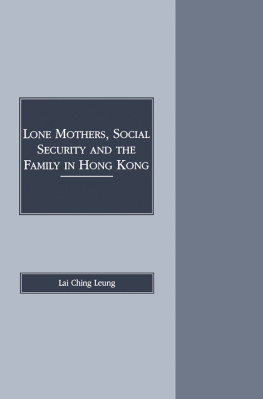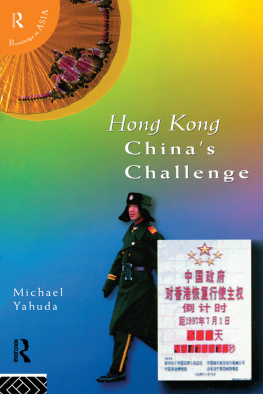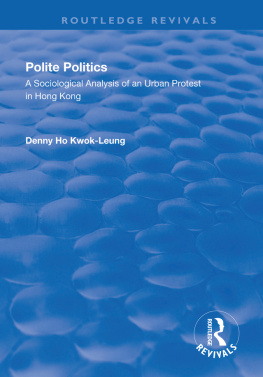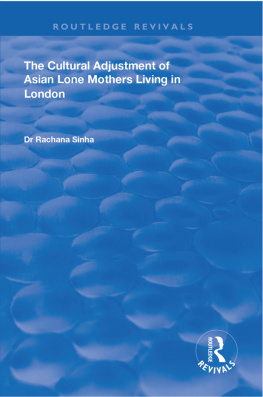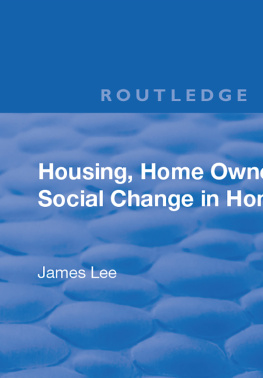This study concerns lone mothers drawing social security benefits and the possible influence of this on their incentive to take up paid employment. The rising levels of public expenditure and declining rates of economic growth have become one of the major worries in the western countries such as UK and the USA. This has strengthened the traditional view that the receipt of social security benefits creates disincentives to work among benefit claimants. In turn this has been interpreted by some people in a way that blames the unemployed and lone mothers for their condition.
Work disincentive debates in Western countries call for comparison to be made with policy studies in Hong Kong. How similar is the situation of lone mothers in Hong Kong to that of lone mothers in Western countries? What factors affect the decision of lone mothers whether to stay on social security or go out to work? Do they really make rational choices between paid work or staying on benefits? Do they set reservation wages and if so how? Do lone mothers see themselves as earners or carers after the marriage breakdown? This study attempts to throw light on these questions.
To understand the incentive to work concerning benefits claimants, one needs to scrutinize the twin notions of dependency culture and underclass. Individualistic explanations argue that the generosity of social security benefits creates work disincentives (Gilder, 1982; Auletta, 1982; Murray, 1984), while structural explanations look for the causes in the structures of society (Darhendorf, 1990; Walker, 1990; Dean and Taylor-Gooby, 1992; Field, 1992; George, 1993). A great deal of evidence from research studies refutes the claim that benefit claimants stay out of work because they are financially better off living on benefits than in work (McLaughlin et al., 1989; Ritchie, 1990; Garman et al., 1992). It is also dangerous to assume that being unemployed is regarded as socially morally acceptable, even among the unemployed. On the contrary, the economic dependency of benefit claimants is socially constructed. Most claimants are trapped into the social security system.
Current debates on work incentives suffer from two further deficiencies. First, they are mainly focused on the impact of social security benefits on unemployed (mostly men) rather than on women who stay out of work (in particular lone mothers with dependent children), though some structuralist have acknowledged that gender is one of the sources of poverty i.e. for women. Otherwise, debates on social security and lone mothers are concerned the consequences of social security benefits to the growth of illegitimate children. Second, previous research studies concentrate on the effects of benefits on the labour supply of the unemployed, rather than the processes operating within the social security system as a whole.
To understand the economic dependency of lone mothers, as some feminist writers suggest, we should take into account the gendered division of labour in the family and in the labour market (Glendinning and Millar, 1992; Evans, 1988; Lister, 1992). The economic dependency of women on the state is not only the result of lone-parenthood but also stems from their position in the labour market. It will be revealing to compare the different economic circumstances of lone mothers and lone fathers (Weale et al., 1984; Brown, 1989).
For these reasons, this study attempts to examine both the processes as well as the effects of the social security system on the labour supply of lone mothers in Hong Kong. Two particular aspects of the labour supply behaviour of lone mothers are explored: first, the possible effects of social security on lone mothers employment; and second, knowledge and perceptions of social security benefits in the decision-making processes of lone mothers in relation to taking up paid work. A feminist analysis has been adopted in this study in order to avoid gender-bias in the research processes.
To understand the work incentive issue in the Hong Kong context, it is also important to bear in mind the effects of colonial social policy - miminal interventionist policy in social welfare and laissez-faire policy in economic affairs. As we know, total public expenditure has been far lower than has been standard among the OECD countries. For example, public expenditure in Hong Kong in 1986 was 15.9 per cent of GDP, only a little higher in percentage than Spains 15.2 per cent, which was the lowest among OECD countries, and well below Belgiums 35.8 per cent, which was the highest (Chan, 1995, p.42, OECD data as quoted in Cochrane, 1993, p.243244). Social security policy in Hong Kong, as MacPherson (1993) points out, has been seen as a safety net for those unable to support themselves and without relatives willing to support them. It is a policy of absolute minimum expenditure, and minimum intervention in the market or the system of family obligation. It is no surprise that people in Hong Kong are very resistant to the idea of claiming Benefits.

